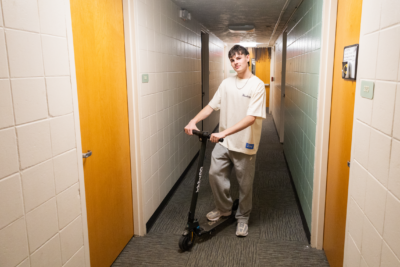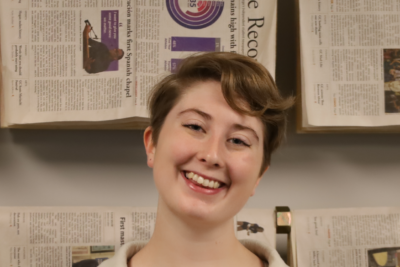This past summer, 18 Goshen College students participated in Maple Scholars, the college’s summer research program. Maple Scholars is an eight-week long research experience in which students work with faculty members on projects in a variety of disciplines. This year, students explored topics from honeybee genetics to early Anabaptist history.
Elizabeth Franks-North, a senior English secondary-education double major, said she joined the program to gain experience in the research side of education and to prepare her for student teaching.“I was dreadfully naïve about what real research would be like and how to do it,” she said. “I also wanted to get into a mindset before student teaching that would allow me to be able to engage students’ critical thinking and apply it to real-life issues in our society.”
Franks-North worked with Suzanne Ehst, Goshen’s director of secondary education. They studied social justice education theory in the context of English education. Franks-North said the experience made her more aware of the differences between receiving an education and providing one.
“I was interested [in the program] because I am just now beginning to bridge the gap from idealistic undergraduate to realistic educator,” Franks-North said.
While some students collected their own data, others spent time analyzing data already available. Junior physics major Isaiah Breckbill worked with physics professor Paul Meyer-Reimer to understand changes in global water availability. The two used satellite data made public by NASA to track the rising and falling of water tables in densely populated area like northern India.
“Northern India has very little surface water, but that part of the subcontinent supports over 600 million people,” Breckbill said. “They are losing 54 cubic kilometers of water per year.”
For Breckbill, the whole Maple Scholars experience made for a memorable summer.
“It was cool to live with people who were doing one project over the summer. They were spending so much time on one thing that we could learn a lot about their projects,” he said.
Faculty benefit from the program, as well, by getting the opportunity to work closely with students and a time to explore their research interests more in depth. Professor of Bible and Religion Paul Keim has been involved in the program for 10 years, and is now a co-director of the program. Keim worked with senior Bible and religion major Anneliese Baer on a project that dealt somewhat with a commentary that Keim has been commissioned to write on the Book of Job.
“We looked through Anabaptist writings looking for reference to Job,” Keim said. “The book of Job offers various answers to the question ‘Why do we suffer?’ [We wondered] how did the Anabaptists refer to that?”
David Housman, chair of the mathematics department, worked with sophomore Kenan Bitikofer analyzing different scenarios involving the Prisoner’s Dilemma, a classic model in Game Theory.
Housman enjoyed being able to take a pedagogical approach to research, saying he enjoys “seeing students struggle with a problem and get somewhere with it; being able to communicate it.”
All students were able to share their progress with each other each Friday during an academic colloquium. Keim said that the meetings helped to “develop ways to talk to each other and not just develop specialized ways to talk to people in your discipline.”
Others involved in the program appreciated the interdisciplinary nature of the setting as well, and were thrilled to have the opportunity. Students interested doing Maple Scholars next summer can talk to John Ross-Buschert or Paul Keim, the co-directors of the program.
“The interdisciplinary side of it is fascinating, and the ability to do interesting, thought-provoking research is a rich opportunity. I would highly recommend it to any interested scholar,” Franks-North said.


